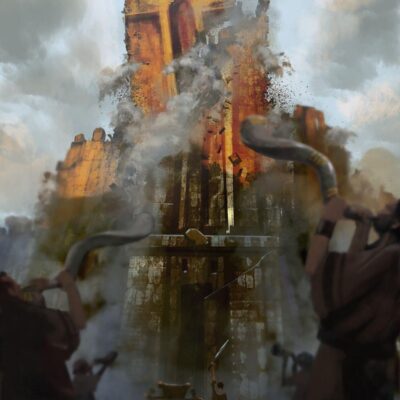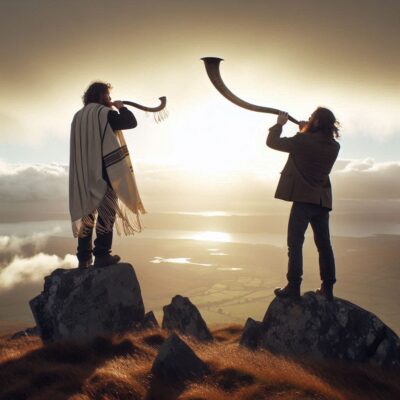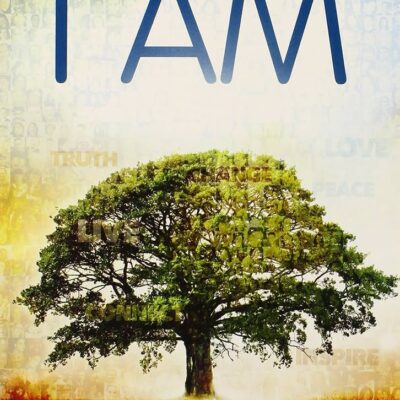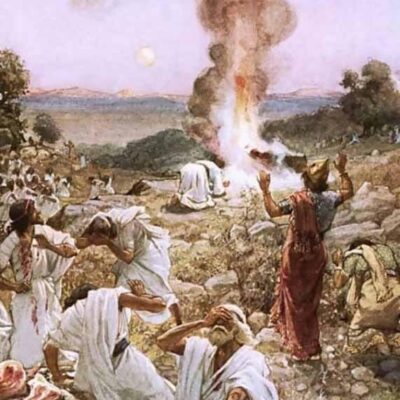“And Yahweh appeared to Abraham by the oaks of Mamre….. and he lifted his eyes and behold a triad of men were standing by him…. and Yahweh said to Abraham why did Sarah laugh saying truthfully will I be with child when I am old?”. It is very easy to miss that crucial detail “And Yahweh…” we have become so familiar with older translations which imposed their understanding and theology on Genesis 18 that the sheer magnitude of this event is lost on us as we assume that the Angel of the LORD appeared – but there is no ambiguity in the Hebrew text – Yahweh appeared and conversed with Abraham, just as He would do with Moses at the burning bush.
–
The Torah portion this week is entitled ‘Vayera’; so named because ‘vayera’ is the first word of the passage that we commonly refer to in English as Genesis 18, with Vayera meaning ‘And he appeared’.
–
From last week’s reading we know that Yahweh had already appeared to Abraham (Genesis 17) when Abram was 99 years-old and revealed His dream for him that he would become a father of nations and God had initiated His Covenant with Abraham. The dream and vision were irrefutably God’s – Abraham was grappling to even comprehend how this plan could materialise – even suggesting to God “if only Ishmael were acceptable to you….?!” Genesis 17:18. But God did not need to have a brainstorming exercise with Abraham in order to come up with a solution! God had a plan that would gradually unfold for a child to be miraculously conceived, a son who would thrive and grow into a young man, a man who would travel by donkey to Mount Mariah (Jerusalem as it is known today) to be bound and placed on an altar (the Rock which lies behind the Western Wall below the Dome of the Rock), and for God’s merciful redemptive plan to be revealed as a ram caught in a thicket (a ram with a crown of thorns) was sacrificed in Isaac’s place.
–
The Haftorah weekly portion was 2 Kings 4:1-37 – the Widow’s Oil and then another story of a woman unexpectedly promised a son – a son who would die and then be raised from the dead. Elijah had wanted to express his thanks for the Shunamite woman’s hospitality and his servant Gehazi had suggested that since the woman had no son and her husband was old they could pray for a son to be born. Like Sarah, the Shunamite woman was not expecting to be expecting! 2 Kings 4:16 challenging his prophesy with “No, man of God – do not lie to me!”.
–
There are so many types and shadows contained within these stories and many of them are obvious with the benefit of hindsight to us as we stand on the other side of the most significant event in world history the life and death of Yeshua HaMashiach. The miraculous birth, the Lamb slain, the crown of thorns, the resurrection to life, but there are more layers of detail often overlooked.
–
Do we fail to notice the food offered to the LORD by Abraham? In Genesis 18:6-7 we read that Abraham ran to his herd to catch a calf while Sarah baked fresh bread, and then the following day when two angels entered Lot’s in Sodom, Lot prepared a feast of unleavened bread for them to eat. Veal and fresh bread from Abraham, flatbread from Lot? Maybe Abraham could display his wealth more ostentatiously by killing a calf whereas Lot, living in the city of Sodom, had less room for a herd of cattle? Maybe Abraham was a carnivore and Lot a practicing vegan? The danger in interpreting biblical events purely from our modern Western perspective is that we often misinterpret important details.
–
Leviticus chapter 23 contains important instruction on the 7 Feast of the LORD. The Israelites were told to observe the Feasts, but the Feasts were not the Feasts of the Israelites; they were the Feasts of the LORD! This may seem a minor detail but if we read through Leviticus 23 we will see that they were Feasts of the LORD – Lev 23:4 “These are the LORD’s appointed feasts, the sacred assemblies you are to proclaim at their appointed times”….(v14) “this is to be a permanent statute for the generations to come” (v14). The appointed times, or Moedim as they are called in Hebrew, were significant times every year when Yahweh wanted to meet with His people, and God has not changed for He still wants to meet with all of His people on His Feast Days and Sabbaths.
–
What is particularly significant here, however, is that even prior to the time when Yahweh revealed the times and dates of the Feasts of the LORD to Moses, Yahweh appeared before Abraham (an appointed time of encounter, a Moed) with the calf and bread being offered to Yahweh and then the following day unleavened bread being eaten by Lot and the angels. Abraham offered a calf on what may well have been the appointed time/date of Pesach and then Lot offered unleavened bread the following day on the Feast of Unleavened Bread. Indeed we read in Genesis 19:3 that Lot prepared a Feast of Unleavened Bread for the angels. I am not denying that the Feasts of the LORD were a reminder to Israel of how Yahweh had delivered His people from slavery, but we often miss an even greater plan that was already in place that there were appointed times and seasons which God had ordained for encounter.
–
But why The Litmus Test? The world seems to be caught up in a whirlwind of chaos and cruelty. Externally we see confusion and mis-information and it can appear that events are out of control! Many local businesses were reduced to nothing 3 years ago when Coronavirus impacted the world economy. Dreams shattered. Hopes in tatters….
–
Yes the account of Abraham and Issac and Lot and the Shunamite woman carry a prophetic symbolism of events to come when Yeshua would live and walk on this earth as Immanuel – God with us. But the nugget of truth that when Yahweh, the LORD has a plan and a purpose it doesn’t matter if the circumstances are not ideal – indeed that is the very time when we will see the miraculous appear! Neither Sarah nor the Shunamite woman were under any illusion that they would hear the patter of tiny feet – until the LORD’s plans were revealed to them.
–
Psalm 139:17-18 “How precious are your thoughts (purposes) oh God, how vast in number. If I could count them they would be more numerous than the sand”. Our thoughts and dreams only succeed when they are in alignment with God’s purposes. The Litmus Test is whether our dreams are our dreams or are we willing to take the risk and seek God’s dreams for our lives. In the grand scheme we are small but are invited to be part of that great plan. Our significance is in Him alone.













